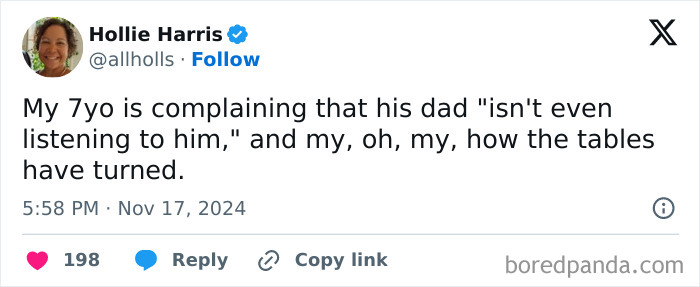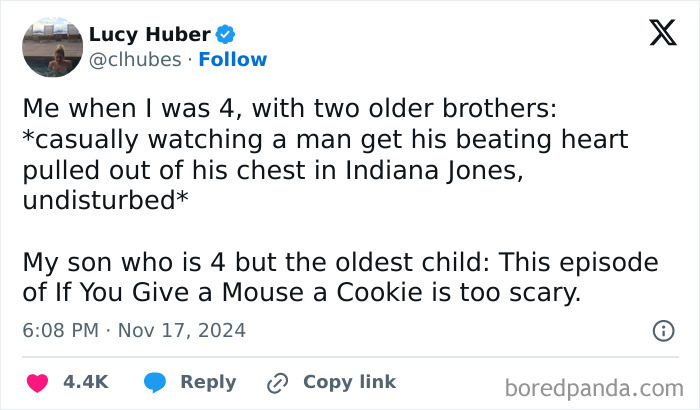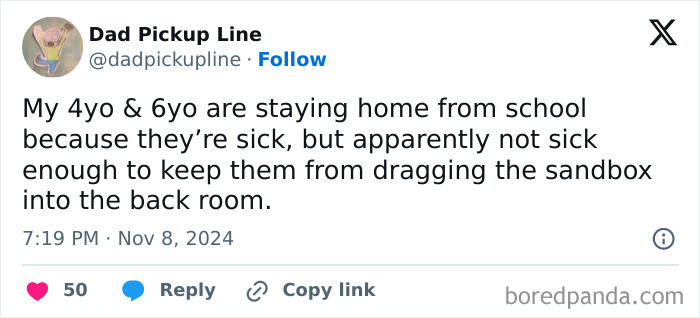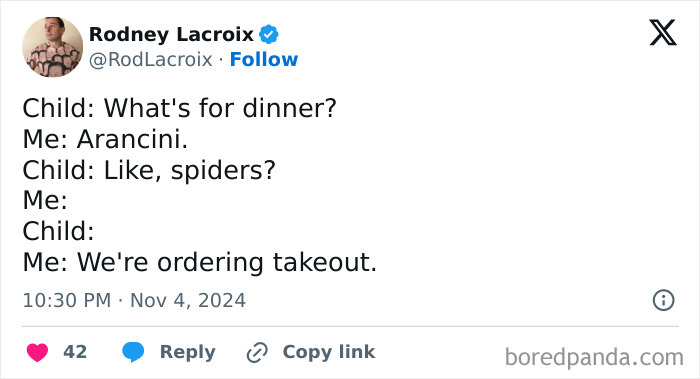Parentingisn’t always a stroll in the park. Sometimes, it can feel like riding a unicycle on a tightrope while juggling four bowling pins.Raising a child has its fair share of stressors, and it’s all about finding the lighter side. These moms and dads did, and they’resharing their storieson social media. They allsaw the humorin their children’s whiney, sassy, and stubborn moments.Hopefully, theseadorable little anecdoteswill bring you some good vibes today. If you’re a parent reading this, see how many of these you can relate to.This post may includeaffiliate links.
Parentingisn’t always a stroll in the park. Sometimes, it can feel like riding a unicycle on a tightrope while juggling four bowling pins.
Raising a child has its fair share of stressors, and it’s all about finding the lighter side. These moms and dads did, and they’resharing their storieson social media. They allsaw the humorin their children’s whiney, sassy, and stubborn moments.
Hopefully, theseadorable little anecdoteswill bring you some good vibes today. If you’re a parent reading this, see how many of these you can relate to.
This post may includeaffiliate links.

RELATED:


These posts portray parenting problems as lighthearted, and many are, indeed, laughable. However, some issues are severe enough to warrant professional intervention.



Licensed psychotherapistDr. Terry Levysays kids lie primarily for two reasons: for social acceptance and out of fear of the consequences of telling the truth.To fix this potentially irreparable problem, Dr. Levy advises against doling out punishment or lecturing. Instead, he recommends helping children understand the natural consequence: people will not believe them.“It’s much more productive to diminish the advantages your child gets from lying—take away the payoffs,” Dr. Levy wrote in an article forLinkedIn.
Licensed psychotherapistDr. Terry Levysays kids lie primarily for two reasons: for social acceptance and out of fear of the consequences of telling the truth.
To fix this potentially irreparable problem, Dr. Levy advises against doling out punishment or lecturing. Instead, he recommends helping children understand the natural consequence: people will not believe them.
“It’s much more productive to diminish the advantages your child gets from lying—take away the payoffs,” Dr. Levy wrote in an article forLinkedIn.



Many children are also picky eaters. In an article forHarvard Health Publishing, primary care pediatricianDr. Claire McCarthypoints out that being selective about meals is a child’s way of asserting independence.



Temper tantrums are typical among children. However, they can become problematic if they occur frequently in public. Fussiness is usually a way for a child to express their frustrations. According toJohns Hopkins Medicine, these episodes typically last for 15 minutes.If it happens in public, pediatric psychologistDr. Jennifer Katzensteinrecommends bringing the child to a safe place where the parent can keep an eye on them. She then suggests letting the child have a tantrum while managing the stares and glances from others.Dr. Katzenstein also reminds parents of the importance of reminding themselves they are doing the right thing.
Temper tantrums are typical among children. However, they can become problematic if they occur frequently in public. Fussiness is usually a way for a child to express their frustrations. According toJohns Hopkins Medicine, these episodes typically last for 15 minutes.
If it happens in public, pediatric psychologistDr. Jennifer Katzensteinrecommends bringing the child to a safe place where the parent can keep an eye on them. She then suggests letting the child have a tantrum while managing the stares and glances from others.
Dr. Katzenstein also reminds parents of the importance of reminding themselves they are doing the right thing.



Meanwhile, Dr. Levy recommends a more proactive approach, which begins with an assessment. He suggests asking an important question: Does the child have the self-control to behave in public?From there, parents can choose not to bring their children along or give them another chance. If the incident happens again, consequences may be warranted.“Actions speak louder than words, and your child will soon realize you mean business,” he wrote.
Meanwhile, Dr. Levy recommends a more proactive approach, which begins with an assessment. He suggests asking an important question: Does the child have the self-control to behave in public?
From there, parents can choose not to bring their children along or give them another chance. If the incident happens again, consequences may be warranted.
“Actions speak louder than words, and your child will soon realize you mean business,” he wrote.



Readers, we’d like to hear from you, too. Especially for moms and dads out there, do you havesimilar storiesyou can share? What are the common challenges you face as parents? Comment below!
































Continue reading with Bored Panda PremiumUnlimited contentAd-free browsingDark modeSubscribe nowAlready a subscriber?Sign In
Continue reading with Bored Panda Premium
Unlimited contentAd-free browsingDark mode
Unlimited content
Ad-free browsing
Dark mode
Subscribe nowAlready a subscriber?Sign In






See Also on Bored Panda

















































Modal closeAdd New ImageModal closeAdd Your Photo To This ListPlease use high-res photos without watermarksOoops! Your image is too large, maximum file size is 8 MB.Not your original work?Add sourcePublish
Modal close
Add New ImageModal closeAdd Your Photo To This ListPlease use high-res photos without watermarksOoops! Your image is too large, maximum file size is 8 MB.Not your original work?Add sourcePublish
Modal closeAdd Your Photo To This ListPlease use high-res photos without watermarksOoops! Your image is too large, maximum file size is 8 MB.Not your original work?Add sourcePublish
Add Your Photo To This ListPlease use high-res photos without watermarksOoops! Your image is too large, maximum file size is 8 MB.
Add Your Photo To This List
Please use high-res photos without watermarks
Ooops! Your image is too large, maximum file size is 8 MB.
Not your original work?Add source
Modal closeModal closeOoops! Your image is too large, maximum file size is 8 MB.UploadUploadError occurred when generating embed. Please check link and try again.TwitterRender conversationUse html versionGenerate not embedded versionAdd watermarkInstagramShow Image OnlyHide CaptionCropAdd watermarkFacebookShow Image OnlyAdd watermarkChangeSourceTitleUpdateAdd Image
Modal closeOoops! Your image is too large, maximum file size is 8 MB.UploadUploadError occurred when generating embed. Please check link and try again.TwitterRender conversationUse html versionGenerate not embedded versionAdd watermarkInstagramShow Image OnlyHide CaptionCropAdd watermarkFacebookShow Image OnlyAdd watermarkChangeSourceTitleUpdateAdd Image
Upload
UploadError occurred when generating embed. Please check link and try again.TwitterRender conversationUse html versionGenerate not embedded versionAdd watermarkInstagramShow Image OnlyHide CaptionCropAdd watermarkFacebookShow Image OnlyAdd watermark
Error occurred when generating embed. Please check link and try again.
TwitterRender conversationUse html versionGenerate not embedded versionAdd watermark
InstagramShow Image OnlyHide CaptionCropAdd watermark
FacebookShow Image OnlyAdd watermark
ChangeSourceTitle
You May Like30 Of The Most Hilarious Posts From Parents That Made People Laugh This FebruaryIlona Baliūnaitė40 Pics Of Dads Being Extra Wholesome That Are Bound To Warm Your Heart (New Pics)Justinas Keturka“Putting Their Child In A Beauty Pageant”: 30 Behaviors That Scream “Trashy Parenting”Shelly Fourer
Ilona Baliūnaitė
Justinas Keturka
Shelly Fourer
Parenting